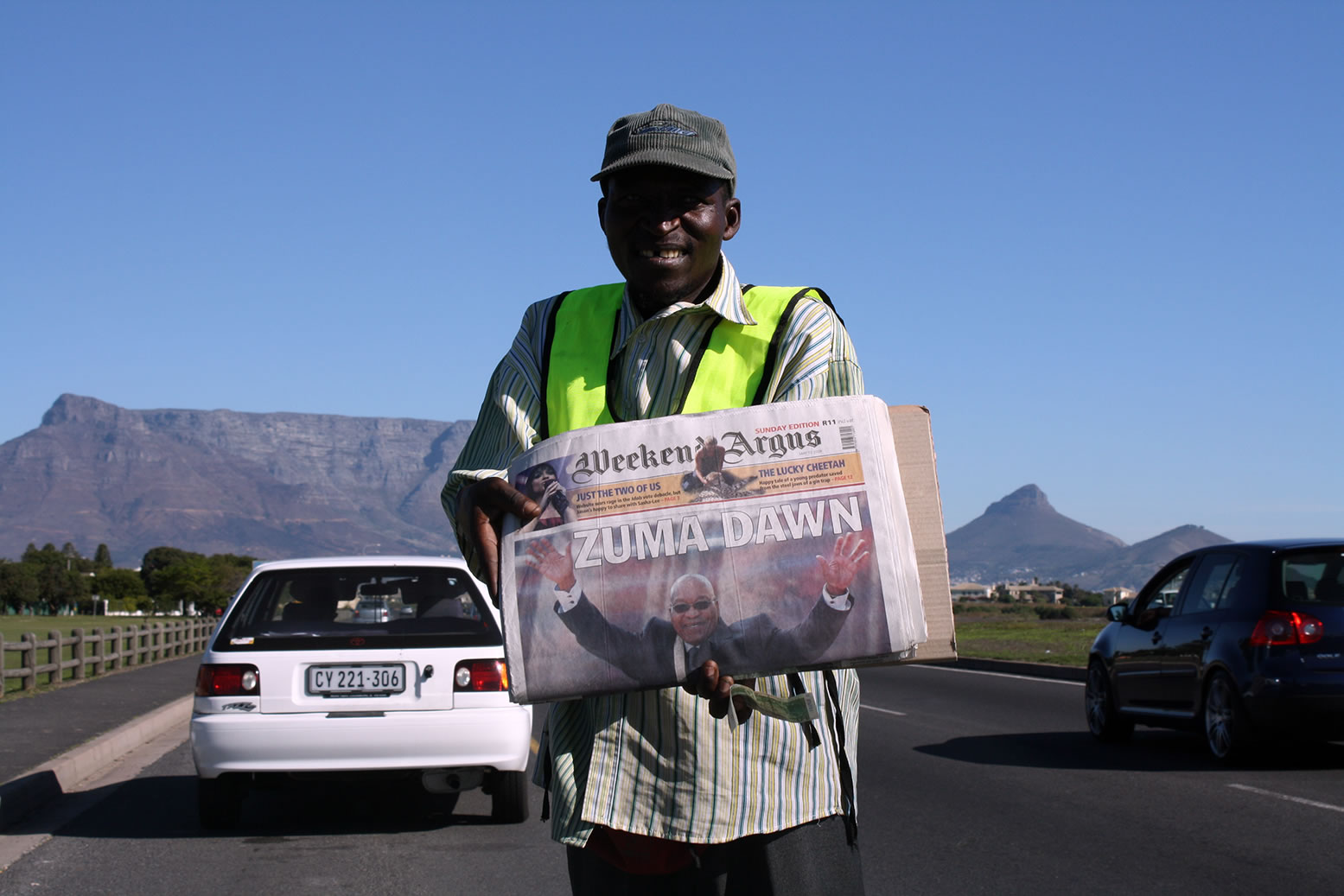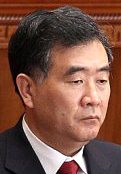|
Presidency Of Jacob Zuma
Jacob Zuma's tenure as South Africa's fourth post-apartheid president began on 9 May 2009 and ended on 14 February 2018. He held office under a mandate from the parliamentary caucus of the African National Congress (ANC), which had governed South Africa since 1994 and which won comfortable majorities in the 2009 and 2014 national elections. His presidency was beset by controversy, and he faced, and defeated, an impeachment attempt and a record eight motions of no confidence in the South African Parliament, four of which went to a vote. His party asked him to resign in February 2018, ahead of the constitutional end of his second term. Zuma's administration launched the R4-trillion National Infrastructure Plan and signed a controversial nuclear power deal with the Russian government, blocked by the Western Cape High Court in 2017. The administration was praised for its progressive HIV/AIDS policy. As president, Zuma increasingly relied on left-wing populist rhetoric, and in his 20 ... [...More Info...] [...Related Items...] OR: [Wikipedia] [Google] [Baidu] |
President Of The Republic Of South Africa
The president of South Africa is the head of state and head of government of the Republic of South Africa. The president heads the executive branch of the Government of South Africa and is the commander-in-chief of the South African National Defence Force. Between 1961 and 1994, the office of head of state was the state presidency. The president is elected by the National Assembly, the lower house of Parliament, and is usually the leader of the largest party, which has been the African National Congress since the first multiracial election was held on 27 April 1994. The Constitution limits the president's time in office to two five-year terms. The first president to be elected under the new constitution was Nelson Mandela. The incumbent is Cyril Ramaphosa, who was elected by the National Assembly on 15 February 2018 following the resignation of Jacob Zuma. Under the interim constitution (valid from 1994–96), there was a Government of National Unity (South Africa), Gove ... [...More Info...] [...Related Items...] OR: [Wikipedia] [Google] [Baidu] |
Western Cape Division
The Western Cape Division of the High Court of South Africa (previously named the Cape Provincial Division and the Western Cape High Court, and commonly known as the Cape High Court) is a superior court of law with general jurisdiction over the Western Cape province of South Africa (except for the Murraysburg district which falls within the jurisdiction of the Eastern Cape Division). The division, which sits at Cape Town, consists of 31 judges led by Judge President John Hlophe. History The origins of the Western Cape Division lie in the Supreme Court of the Colony of the Cape of Good Hope, which was established on 1 January 1828 as the highest court of the Cape Colony. It was created by the First Charter of Justice, letters patent issued by George IV on 24 August 1827. Upon the creation of the Union of South Africa in 1910, the Supreme Court of the Cape Colony was transformed by the South Africa Act 1909 into the Cape of Good Hope Provincial Division of the new Supreme Cour ... [...More Info...] [...Related Items...] OR: [Wikipedia] [Google] [Baidu] |
First Libyan Civil War
The First Libyan Civil War was an armed conflict in 2011 in the North African country of Libya that was fought between forces loyal to Colonel Muammar Gaddafi and rebel groups that were seeking to oust his government. It erupted with the Libyan Revolution, also known as the 17 February Revolution. The war was preceded by protests in Zawiya on 8 August 2009 and finally ignited by protests in Benghazi beginning on Tuesday, 15 February 2011, which led to clashes with security forces who fired on the crowd. The protests escalated into a rebellion that spread across the country, with the forces opposing Gaddafi establishing an interim governing body, the National Transitional Council. The United Nations Security Council passed an initial resolution on 26 February, freezing the assets of Gaddafi and his inner circle and restricting their travel, and referred the matter to the International Criminal Court for investigation. In early March, Gaddafi's forces rallied, pushed eastwards ... [...More Info...] [...Related Items...] OR: [Wikipedia] [Google] [Baidu] |
United Nations Security Council
The United Nations Security Council (UNSC) is one of the Organs of the United Nations, six principal organs of the United Nations (UN) and is charged with ensuring international security, international peace and security, recommending the admission of new UN members to the United Nations General Assembly, General Assembly, and approving any changes to the UN Charter. Its powers include establishing peacekeeping operations, enacting international sanctions, and authorizing military action. The UNSC is the only UN body with the authority to issue binding United Nations Security Council resolution, resolutions on member states. Like the UN as a whole, the Security Council was created after World War II to address the failings of the League of Nations in maintaining world peace. It held its first session on 17 January 1946 but was largely paralyzed in the following decades by the Cold War between the United States and the Soviet Union (and their allies). Nevertheless, it authorized ... [...More Info...] [...Related Items...] OR: [Wikipedia] [Google] [Baidu] |
BRICS
BRICS is an acronym for five leading emerging economies: Brazil, Russia, India, China, and South Africa. The first four were initially grouped as " BRIC" (or "the BRICs") in 2001 by Goldman Sachs economist Jim O'Neill, who coined the term to describe fast-growing economies that would collectively dominate the global economy by 2050; South Africa was added in 2010. The BRICS have a combined area of and an estimated total population of about 3.21 billion, or about 26.7% of the world's land surface and 41.5% of the global population. Brazil, Russia, India, and China are among the world's ten largest countries by population, area, and GDP, and are widely considered to be current or emerging superpowers. All five states are members of the G20, with a combined nominal GDP of US$26.6 trillion (about 26.2% of the gross world product), a total GDP (PPP) of around US$51.99 trillion (32.1% of global GDP PPP), and an estimated US$4.46 trillion in combined foreign reserves ( ... [...More Info...] [...Related Items...] OR: [Wikipedia] [Google] [Baidu] |
Economic Diplomacy
Economic diplomacy is a form of diplomacy that uses the full spectrum of economic tools of a state to achieve its national interests. The scope of economic diplomacy can encompass all of the international economic activities of a state, including, but not limited to, policy decisions designed to influence exports, imports, investments, lending, aid, free trade agreements, etc. Economic diplomacy is concerned with economic policy issues, e.g. work of delegations at standard setting organizations such as World Trade Organization (WTO). Economic diplomats also monitor and report on economic policies in foreign countries and give the home government advice on how to best influence them. Economic diplomacy employs economic resources, either as rewards or sanctions, in pursuit of a particular foreign policy objective. This is sometimes called "economic statecraft". Background and definitions Economic diplomacy is traditionally defined as the decision-making, policy-making and advocatin ... [...More Info...] [...Related Items...] OR: [Wikipedia] [Google] [Baidu] |
South–South Cooperation
South–South cooperation (SSC) is a term historically used by policymakers and academics to describe the exchange of resources, technology, and knowledge between developing countries, also known as countries of the Global South. The Global South is making increasingly significant contributions to global development. The economic and geopolitical relevance of many countries has grown. In the past, south-south cooperation focused on sharing knowledge and building capacities, but the countries of the Global South and new financial institutions have recently also become increasingly active in development finance. History The formation of SSC can be traced to the Asian–African Conference that took place in Bandung, Indonesia, in 1955 which is also known as the Bandung Conference. The conference has been largely regarded as a milestone for SSC cooperation. Indonesia's president at that time, Sukarno, referred to it as "the first intercontinental conference of coloured peoples in th ... [...More Info...] [...Related Items...] OR: [Wikipedia] [Google] [Baidu] |
Black Economic Empowerment
Black Economic Empowerment (BEE) is a policy of the South African government which aims to facilitate broader participation in the economy by black people. A form of affirmative action, it is intended especially to redress the inequalities created by apartheid. The policy provides incentives – especially preferential treatment in government procurement processes – to businesses which contribute to black economic empowerment according to several measurable criteria, including through partial or majority black ownership, hiring black employees, and contracting with black-owned suppliers. The preferential procurement aspect of BEE has been viewed as paradigmatic of a sustainable procurement approach, whereby government procurement is used to advance social policy objectives. So-called "BEE deals" – transactions aiming to increase black ownership of large businesses – have been conducted on a large scale, with BEE transactions concluded between 1994 and 2005 valued at betwe ... [...More Info...] [...Related Items...] OR: [Wikipedia] [Google] [Baidu] |
Higher Education In South Africa
Education in South Africa is governed by two national departments, namely the Department of Basic Education (DBE), which is responsible for primary and secondary schools, and the Department of Higher Education and Training (DHET), which is responsible for tertiary education and vocational training. Prior to 2009, both departments were represented in a single Department of Education. Among sub-Saharan African countries, South Africa has one of the highest literacy rates. According to The World Factbook - Central Intelligence Agency as of 2019, 95% of the population age 15 and over can read and write in South Africa were respectively literate. The DBE department deals with public schools, private schools (also referred to by the department as independent schools), early childhood development (ECD) centres, and special needs schools. The public schools and private schools are collectively known as ordinary schools, which are roughly 97% of schools in South Africa. The DHET dep ... [...More Info...] [...Related Items...] OR: [Wikipedia] [Google] [Baidu] |
Land Reform In South Africa
Land reform in South Africa is the promise of "land restitution" to empower farm workers (who now have the opportunity to become farmers) and reduce inequality. This also refers to aspects such as, property, possibly white owned businesses. Proponents argue it will allow previously unemployed people to participate in the economy and better the country's economic growth. It also relates to restitution in the form of settling Land Claims of people who were forcefully removed from their homes in urban areas that were declared white, by the apartheid government's segregationist Group Areas Act: such areas include Sophiatown, Fietas, Cato Manor, District Six and Greyville; as well as restitution for people forcibly evicted from rural land because of apartheid policies. However, many South Africans and foreign commentators have also voiced alarm over the failure of the redistribution policy, having failed around 50% of land reform projects. Details The Land Reform Process focuse ... [...More Info...] [...Related Items...] OR: [Wikipedia] [Google] [Baidu] |


.jpg)



